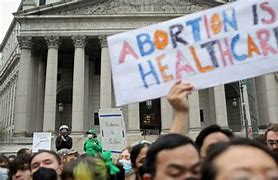The Overturning of Roe V. Wade

Roe V. Wade was a landmark decision by the U.S. Supreme Court in which the Court ruled that the Constitution of the United States protects a pregnant woman’s liberty to choose to have an abortion without excessive government restriction. This decision struck down many U.S. federal and state abortion laws.
In the biggening of May, a draft opinion was leaked indicating that the Supreme Court is ready to abolish the 1973 Roe V. Wade decision establishing a constitutional right to abortion. The draft isn’t final, however there are a lot of questions about what would happen if the court decided that Roe “must be overruled” and the issue to abortion returned “to the people’s elected representatives,” as the draft said?
Jurisdiction would most likely go back to the states, likely setting up a patchwork of abortion restrictions and rights across the country. Roe v. Wade said states couldn’t limit abortion before a fetus is viable, or able to survive outside the womb, which is considered to be about 24 weeks of gestation. However, state laws have sought to challenge the point of viability of the standard itself. For example, there was a lawsuit over Mississippi’s ban on abortion after 15 weeks of gestation “except in medical emergency and in the case of severe fetal abnormality.” The latest abortion surveillance report from the Centers for Disease Control and Prevention said in 2019, “nearly all” abortions, 92.7%, occurred by 13 weeks’ gestation or less; 79.3% occurred by nine weeks’ gestation.
The Center for Reproductive Rights, an advocacy and legal group supporting abortion rights, brands 25 states “hostile” to abortion rights, saying they would be likely to prohibit of severely restrict abortion, or make it difficult to get one. According to factcheck.org the Center for Reproductive Rights says “If Roe is overturned, these laws could be revived in one of two ways. In some states, a ban was never declared unconstitutional or blocked by the courts, and therefore if Roe is limited or overturned, states officials could seek to enforce it. In other states, where courts have blocked or limited a pre-Roe ban based on the decision, officials could file court actions asking courts to activate the ban if Roe fell.”
Thirteen states have passed so-called “trigger laws” after Roe to ban abortion if overturned. Those states include Idaho, Kentucky, Louisiana, Missouri, North Dakota, South Dakota, Tennessee, Texas, Utah, and Wyoming, as well as three of the states that also have pre-Roe bans.
Seven States have laws that “expressed intent to limit abortion to maximum extent permitted” in the absence of Roe, the Guttmacher Institute says. Kansas and Ohio are the only two among them that also don’t have “trigger laws’ or pre-Roe bans enacted.
The Center for Reproductive Rights claims that here in Maryland Abortions will remain legal. In Maryland, legislature recently passed a bill expanding the definition of providers qualified to perform an abortion, establishing an abortion training program funded by the state, and requiring most insurance companies to cover the cost of an abortion, according to a Reuters report. Gov. Larry Hogan vetoed the bill, but the legislature overrode the veto. Maryland leaders even spoke out against the Supreme Court’s draft Monday night and Tuesday morning. According to www.patch.com, Democratic Senator Chris Van Hollen said “If this draft decision stands, the Supreme Court will strip American of the reproductive rights and put the lives and health of millions of women at risk.”


